
by Legalnaija | Jul 13, 2021 | Uncategorized
Over 80 corporate sponsors, including Oando Plc, Zenith Bank, Total E & P, among others, have thrown their weight behind the 15th Annual Business Law Conference of the Nigerian Bar Association Section on Business Law (NBA-SBL).
The conference, which begins with a preconference cocktail on Tuesday, July 13, 2021, will run through July 14 and 15 with a total of eight plenary sessions and three breakout sessions.
The sponsorships cover most of the programmes at the two-day conference, including the pre-conference cocktail, plenary sessions, tea breaks, lunch breaks, the SBL Innovation Hub App Challenge, among others.
The 15th annual NBA-SBL Conference holding July 14-15, 2021, with the theme “Re-tooling Business for Change: Leveraging the Tech Explosion”, focuses on how businesses, including the legal profession, can continue to keep pace with and take advantage of technological developments and disruptions in a fast-changing world.
According to a full sponsors list made available by the conference organisers, the sponsors are grouped into Headline Sponsors, Platinum Sponsors, Gold Sponsors, Silver Sponsors, Bronze Sponsors, and Supporters.
The Headline Sponsors are Duale, Ovia and Alex-Adedipe, Africa Law Practice, Omaplex Law firm, Banwo and Ighodalo, Zenith Bank Plc, Babalakin & Co, Flutterwave, Jackson, Etti & Edu, Templars, and the Lagos State government.
On the Platinum Sponsors list are Udo Udoma & Belo-Osagie, The Law Crest LLP, Odujinrin & Adefulu, IHS Towers, Wigwe & Partners, AELEX, Mikano Group (Geely Motors), MRS Holdings Limited, BTO Partners, Detail Commercial Solicitors, George Etomi & Partners, Africa Finance Corporation, and Aluko and Oyebode.
CLP Legal, Giwa-Osagie & Co, Piggyvest Technology Limited, White & Case, South Atlantic Petroleum Limited, Lekki Port Enterprise Limited, Tolaram Group, Oak Legal Compliance, Bloomfield, WalterSmith, and SAPETRO are Gold Sponsors.
The Silver Sponsors include Aarndale Solicitors, NG Clearing Limited, Pavestones Legal, Total E & P, Alliance Law Firm, Paul Usoro & Co, J.K Gadzama, Simonscooper Partners, British American Tobacco, Streamsowers and Kohn, Famsville Solicitors, and Advocaat Law Practice.
Others on the Silver Sponsors list are Nigerian Content Development & Monitoring Board, Union Bank of Nigeria PLC, Foundation Chambers, Unilever PLC, Victoria Chambers, Lagos State Internal Revenue Services, Corporate Affairs Commission, Primera Africa Legal, Austin Peters, Oguntoye & Oguntoye, Coopley, Oando, A02Law, Guinness, and Tokunbo Orimobi LLP.
Twelve Legal, Broderick Bozimo & Co, Akindelano LP, Gbenga Biobaku & Co, Cadbury Nigeria Plc, Nigerian Communications Commission and Sterling Bank are Bronze Sponsors, while SPA Ajibade & Co, The Law House, Babs Animashaun Chambers, Kenna Partners, Chris Uche, SAN & Co, Patreli Partners, Lexavier Partners, ACAS-Law, Everlaw LSP, AB-Legal-Practitioners, Lexavier Partners, and Uchelaw are listed as Supporters.
The conference aims to take participants on an exploration of the topics revolving around the fast-developing relationship between frontier technologies across the world and the business law space, said Ayuli Jemide, chairman, NBA-SBL and lead partner, Detail Commercial Solicitors.
“These conversations are stirred up in hopes of improving the efficiency of legal practice and the competencies of participants,” he said in a preconference note.

by Legalnaija | Jul 12, 2021 | Uncategorized

We know how important your legal career is to you and we have 2 (Two) Tools that can help you advance your legal career.
- The Legalnaija Lawyers Directory
The Directory enables Lawyers complete a professional profile in order to enhance visibility on the Internet. By subscribing to the Directory, a Lawyer increases access to prospective clients and strengthens professional reputation among peers and within the legal community. People who are looking to hire a Lawyer can also visit your profile and contact you via email, or phone call, if you have an active subscription on the Directory. Lawyers who subscribe also benefit directly from the high volume of visitors to the Legalnaija website.
To subscribe, follow these 4 simple steps –
- Log on to https://app.legalnaija.com/signup
- Create and verify your account
- Fill in your details, attach all (Call To Bar certificate, Current payment of professional fees) relevant documents and submit for verification.
- You will be notified of your approval and listing via email.
Failure to attach relevant documents will result in a disqualification. If however your application is suspended, ensure your profile is updated, your credentials are uploaded and resubmit. Subscription fee is 1,000 Naira only monthly. Hurry, you get a 30 day free trial when you sign up.
- The Legalnaija online law bookstore
Law books are the lifeline for lawyers, law firms, law researchers and law students. The importance of law books cannot be overemphasized, and on the Legalnaija online bookstore, we have books that would boost your law practice and help build your law library, all of which are readily available for immediate purchase and nationwide delivery.
Some of the books include;
- THE NIGERIAN ELECTRICITY MARKET; UNDERSTANDING THE TRANSACTIONAL, LEGAL & POLICY ISSUESby Dr. Ayodele Oni
- UNDERSTANDING PETROLEUM (OIL & GAS) TRANSACTIONS AND THE NIGERIAN MARKETby Dr. Ayodele Oni
- BABALOLA’S LAW DICTIONARY OF JUDICIALLY DEFINED WORDS AND PHRASES (2ND EDITION)by Olumide Babalola
- INTERNATIONAL ARBITRATION LAW AND PRACTICE: THE PRACTITIONERS PERSPECTIVEby Tolu Aderemi
- CASEBOOK ON DATA PROTECTION By Olumide Babalola
- SOCIAL MEDIA FOR LAWYERSby Adedunmade Onibokun
- A – Z of Sports Law and Business by Olisa Agabakoba Legal
- A Force of Justice (A book in honour of Hon. Justice Oguntade)
- Casebook on Human Rights Litigation in Nigeria by Frank Agbedo
- Human Rights Litigation In Nigeria: Law Practice And Procedure)
- Journal of Current Law And Arbitration Practice (Vol 1 & 2)
- The Employment Law Handbook by Jamiu Akolade
You can order any of the books above via the Legalnaija Store at www.legalnaija.com/shop.
For more info, contact support at hello@legalnaija.com, via @Legalnaija across your social media platforms or on Whatapp via 09029755663.

by Legalnaija | Jul 12, 2021 | Uncategorized
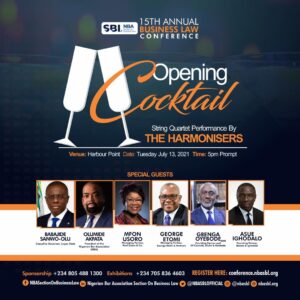
How businesses can leverage technology to drive transformation will be the focus of the 15th annual conference of the Nigerian Bar Association Section on Business Law (NBA-SBL) holding July 14-15, 2021.
The conference, themed “Retooling Business for Change: Leveraging the Tech Explosion”, will feature an array of carefully selected speakers and panellists sourced from the ICT sector, governments, corporate bodies, law firms and law societies.
The annual NBA-SBL conference is a platform for business lawyers within and outside Nigeria to network and engage on issues relevant to their fields as well as to establish a thriving relationship between the business community and government institutions.
According to the organisers, there will be a total of five plenary sessions on Day 1 of the two-day conference.
The first session, with the topic “Tech Innovation and E- Governance”, will be moderated by Ifueko Omoigui-Okauru, Managing Partner at Compliance Professionals Plc, and Coordinated by Temidayo Ajayi-Bello of DETAIL Commercial Solicitors. The panellists include Governor Godwin Obaseki of Edo State, Gabriel Okeowo, Principal Lead/CEO, BudgIT Nigeria, Honourable Justice Kashim Zannah, Chief Judge of Borno State, Yewande Sadiku, Executive Secretary/CEO, NIPC.
Panellists including Mitchell Elegbe, MD/CEO of Interswitch, Olugbenga Agboola, Co-Founder and CEO of Flutterwave, Gisele Nwepu, CEO of Okapi Financial Services, Olaoluwa Awojoodu, CEO of E-Settlement Group, and Babatunde Ogundeyi, Co-Founder/CEO of Kuda Bank, will discuss the topic “The Future of Digital Financial Services & Financial Inclusion” in the second panel session. The session will be moderated by Dayo Ademola, Managing Director, Branch.co., will moderate the session, while Tiwalola Osazuwa of Aelex will be the coordinator.
“Outliers – From Law to There” will be the crux of the discussion at the third panel session with Funke Bucknor-Obruthe, Founder, Zapphaire Events, Audu Maikori, Founder, Chocolate City, Emem Ema, Founder, One Management, and Nnamdi Patrick-Onuh, Founder, Alistair Englebert Preston Photography, as panellists.
Other topics to be tackled on the Day 1 of the conference are “Internet and Broadband Connectivity – Good or Bad?” (Plenary 4) and “We All Have a Story” (Plenary 5).
Dr. Omobola Johnson, Senior Partner, TLcom Capital, will moderate the fourth session which has panellists that include Charles Anudu, CEO of Swift 4G, Prof. U. G. Danbatta, Executive Vice Chairman of Nigeria Communications Commission, Gerald Ilukwe, Pioneer MD, Galaxy Backbone, and Kazeem Oladepo, VP, IHS Towers. The session will be coordinated by Aderonke Alex-Adedipe of Pavestone Solicitors.
Gbenga Oyebode, Founding Partner and Of Counsel, Aluko & Oyebode, Asue Ighodalo, Founding Partner, Banwo & Ighodalo, and Myma Belo-Osagie, Of Counsel, Udo Udoma Belo-Osagie, will be the discussants at the fifth panel, with Ayuli Jemide, Chairman, NBA SBL and Lead Partner, DETAIL Commercial Solicitors, as well as Tobenna Erojikwe, Chairman Board of Governors, Institute of Continuing Legal Education and Partner, The Law Crest LLP, as moderators.
There will also be a Question and Answer session with Oyeyemi Aderibigbe, Senior Associate, Templars, while Dr. Adeoye Adefulu, Vice Chair, NBA-SBL and Partner, Odujinrin & Adefulu, will give the closing remarks.
The panel sessions will be preceded by remarks by the Chairman of the Conference Planning Committee, Adeleke Alex-Adedipe, Managing Partner, Duale, Ovia & Alex-Adedipe (DOA), Conference Framer, Ayuli Jemide, Chairman, NBA-SBL and Lead Partner, DETAIL Commercial Solicitors, and welcome remarks by Olumide Akpata, President of the Nigerian Bar Association (NBA).
Meanwhile, the organisers have confirmed that Lagos State Governor, Babajide Sanwo-Olu, will deliver the opening address, Dr. Wendy Okolo, Intelligence Research Engineer, National Aeronautics and Space Administration (NASA), will give the keynote speech, while Engr. Simbi Wabote, Executive Secretary of the Nigerian Content Development and Monitoring Board (NCDMB), will deliver the goodwill message.

by Legalnaija | Jul 8, 2021 | Directory, Uncategorized

Marketing a law firm online can sometimes like a daunting task, but it doesn’t have to be so if you know what to do. What is most important is that you finally take control of your law firm’s marketing strategy?
In the book, Social Media For Lawyers, Adedunmade Onibokun sets out a concise for lawyers and law firms looking to harness social media resources to grow visibility online. If your goal is to get more clients, or become a thought leader in your area of practice, Social Media For Lawyers is a good place to start, and it’s available on the Legalnaija online bookstore.
One way to market your law practice or law firm is also through subscribing to a Lawyers Directory, and a great directory for Nigerian Lawyers is the Legalnaija online lawyers directory. The Legalnaija Lawyers Directory enables Lawyers complete a professional profile in order to enhance visibility on the Internet. By subscribing to the Directory, a Lawyer increases access to prospective clients and strengthens professional reputation among peers and within the legal community. People who are looking to hire a Lawyer are more likely to visit your profile and contact you via email, or phone call, if you have an active subscription on the Directory. Lawyers who subscribe benefit directly from the high volume of visitors to the Legalnaija website, and Lawyers can also list office location(s), phone numbers and email addresses so that potential clients can make contact right away.
To subscribe, follow these 5 simple steps –
- Log on to https://app.legalnaija.com/signup
- Create an account
- Fill in your details, attach any relevant documents and submit for verification.
- You will be notified of your approval and listing via email.
If however your application is suspended, ensure your profile is filled and your credentials are uploaded and resubmit. Subscription fee is 1,000 Naira monthly only. Hurry, you get a 30 day free trial when you sign up. For more info, contact support at hello@legalnaija.com or via @Legalnaija across your social media platforms.
@Legalnaija
www.legalnaija.com
by Legalnaija | Jul 6, 2021 | Uncategorized
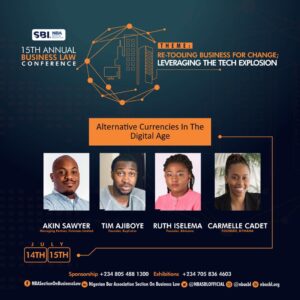
According to Bruce Burk, “Technology is the catalyst by which the world turns” and you will agree that Tech is constantly changing how we work and live today. For Lawyers, the practice of law globally is changing as well. Lawyers once did all of their legal research using books. However, now most of that research is done electronically with legal research databases. Many technologies are available today that are changing the legal profession on a very significant basis, and the NBASBL is gving a front row seat to catch up on all current tech trends at the NBASBL 2021 Annual Conference.
The 15th Annual Business Law Conference, themed Re-tooling Business for Change: Leveraging the Tech Explosion” offers a bigger promise of leading content, plenary sessions, engaging discussions and networking sessions all centered on Tech.
What the SBL is doing here is simply huge because it is the first time the very conservative Nigerian Bar Association would be championing conversations centered on Tech on this scale. Definitely Tech is here and the sooner all Lawyers get onboard and begin to understand the eco – system the better. Moreover, Tech companies can be BIG clients and you really want them to know you know your stuff.
If you are yet to register for the NBASBL conference which holds between the 14th and 15th of June, 2021, then click the Registration Link now.

by Legalnaija | Jul 6, 2021 | Uncategorized
The The Nigerian Bar Association (NBA) Lagos Branch has unveiled theme for it’s 2021 annual Law week as ‘Disruption, Innovation and the Bar.’
This theme is apt especially at a time Information technology is virtually driving major innovations around the world and also changing the way businesses do things ranging from communication to Banking & Payments, Education, Transportation etc.
The fast paced innovation, disruptive solutions and services that information technology is bringing about have serious legal implications for every country including Nigeria.
It is therefore pertinent as Lawyers that we understand the practice of law in this technological era, how to be positioned and relevant. The relevance of a lawyer in a developing Nation and the world at large goes beyond litigation, Lawyers should be aware of how to gain relevance in a changing world and challenges to face.
To give the key note address on this topic at the annual law week are HRH Mohammed Sanusi II and Mrs. Oby Ezekwesili, Public Policy Analyst / Senior Economic Advisor, AEDPI.
These speakers will set the tone for the conference by giving an overview of how technology, innovation and trade liberalisation are disrupting the practice of law across the globe and what it means for the Nigerian legal practitioner.
Mr. Moyosore Onigbanjo SAN, Hon. Attorney-General, Lagos State and Mrs. Efe Etomi would formally open the two-day conference of the NBA Lagos Branch Law Week 2021 with a welcome note.
There would be eight plenary sessions with experts from various sectors of the economy to discuss issues around national security and our fundamental rights; creating world class law firms in Nigeria; bringing justice delivery in Nigeria Into the 21st century; and changing Landscape of arbitrator disclosure obligations.
Other plenary sessions will addresses topics on Financial Autonomy of the Judiciary: Key to Judicial Independence or Ruse?; Young Lawyers, Minimum Wage, Brain Drain and Professional Development; Lawyers Without Borders: Opportunities or Threats? and Career Development Strategies for Professional Growth.

by Legalnaija | Jul 4, 2021 | Uncategorized

The review panel for the NBA-SBL Innovation Hub Challenge has shortlisted 10 applications for the second stage of the challenge which will take place as a session at the Business Law Conference scheduled for July 14 and 15, 2021.
The 10 shortlisted applications were selected from a pool of about 40 applications across a wide spectrum of sectors including healthcare, insurance, education, fitness/wellness, transportation, financial services, and legal services.
The organisers said the quality of entries received show that given an enabling environment and opportunity, Nigerian innovators can make excellent and significant contributions to the digital economy.
The shortlisted innovators will be provided the opportunity to showcase their solutions and will be interviewed by another panel of distinguished judges different from the assessors.
The NBA-Section on Business Law conceived the Innovation Hub Challenge as a response to yearnings for creative and innovative solutions to some of the business and economic challenges facing the nation. The challenge, born out of the theme of this year’s Business Law Conference “Re-Tooling Businesses for Change – Leveraging the tech Explosion”, is an effort by the NBA-SBL (and its partners) to contribute to the growth of the digital economy by providing seed funding and visibility to promising Nigerian innovators.
The Challenge invites Nigerian innovators who are working on promising technology solutions that addresses problems in any of the critical sectors of the economy to present their ideas and demonstrate their solutions to stand a chance of receiving some seed funding to advance their projects.
The review, conducted by a panel of nine astute assessors using a meticulous process, evaluated the applications on the basis of already evaluation criteria which include (1) Creativity & Impact; (2) Technical Feasibility & User Experience; (3) Business Viability & Overall Quality; (4) Team-work & Collaborations.
On creativity & impact, the assessors wanted to know, for instance, what the Big Idea was and what creative solution was being offered. Is the product or service offering a solution that is better, faster, cheaper, more convenient, efficient than whatever options exist?
While the assessors did not look too deeply at the technology driving the solution (the judges will examine and scrutinise that at the conference, they wanted to know what efforts, if at all, had been made by the innovators to test their products with some users and if they are leveraging such user feedback to improve their offering.
The assessors, realising that the seed funding being offered as prizes at the Challenge needed to be properly stewarded, looked under the hood to assess the applicants for business viability. The question the assessors needed answers to included whether there is a compelling business model that shows how value will be created and driven over time and whether the financial model is clear.
It is expected that the process for the second stage will be more rigorous.
Meanwhile, the shortlisted applicants have been invited to complete a second review process which will be evaluated by the panel of judges. Attendees at the conference will also be given an opportunity to vote to determine the most innovative solution. The attendees’ votes will form a part of the grading criteria to determine the final winners.
“We think it is important to add that those innovators who submitted a pitch but did not make the shortlist are encouraged to continue working on their solutions. Many of them are brilliant ideas that require encouragement, nurturing and support,’ said Rotimi Ogunyemi, chair of the CPC 2021 Technology & Innovation Subcommittee, co-chair of the Digital NBA Committee and chair of the ICT Committee, NBA- Section on Business Law.
“The SBL Innovation Hub had limitations as to numbers and was thus constrained to select only the top 10 based on the published criteria and scores,” Ogunyemi said.
The 10 shortlisted applications were selected from a pool of about 40 applications across a wide spectrum of sectors including healthcare, insurance, education, fitness/wellness, transportation, financial services, and legal services.
The organisers said the quality of entries received show that given an enabling environment and opportunity, Nigerian innovators can make excellent and significant contributions to the digital economy.
The shortlisted innovators will be provided the opportunity to showcase their solutions and will be interviewed by another panel of distinguished judges different from the assessors.
The NBA-Section on Business Law conceived the Innovation Hub Challenge as a response to yearnings for creative and innovative solutions to some of the business and economic challenges facing the nation. The challenge, born out of the theme of this year’s Business Law Conference “Re-Tooling Businesses for Change – Leveraging the tech Explosion”, is an effort by the NBA-SBL (and its partners) to contribute to the growth of the digital economy by providing seed funding and visibility to promising Nigerian innovators.
The Challenge invites Nigerian innovators who are working on promising technology solutions that addresses problems in any of the critical sectors of the economy to present their ideas and demonstrate their solutions to stand a chance of receiving some seed funding to advance their projects.
The review, conducted by a panel of nine astute assessors using a meticulous process, evaluated the applications on the basis of already evaluation criteria which include (1) Creativity & Impact; (2) Technical Feasibility & User Experience; (3) Business Viability & Overall Quality; (4) Team-work & Collaborations.
On creativity & impact, the assessors wanted to know, for instance, what the Big Idea was and what creative solution was being offered. Is the product or service offering a solution that is better, faster, cheaper, more convenient, efficient than whatever options exist?
While the assessors did not look too deeply at the technology driving the solution (the judges will examine and scrutinise that at the conference, they wanted to know what efforts, if at all, had been made by the innovators to test their products with some users and if they are leveraging such user feedback to improve their offering.
The assessors, realising that the seed funding being offered as prizes at the Challenge needed to be properly stewarded, looked under the hood to assess the applicants for business viability. The question the assessors needed answers to included whether there is a compelling business model that shows how value will be created and driven over time and whether the financial model is clear.
It is expected that the process for the second stage will be more rigorous.
Meanwhile, the shortlisted applicants have been invited to complete a second review process which will be evaluated by the panel of judges. Attendees at the conference will also be given an opportunity to vote to determine the most innovative solution. The attendees’ votes will form a part of the grading criteria to determine the final winners.
“We think it is important to add that those innovators who submitted a pitch but did not make the shortlist are encouraged to continue working on their solutions. Many of them are brilliant ideas that require encouragement, nurturing and support,’ said Rotimi Ogunyemi, chair of the CPC 2021 Technology & Innovation Subcommittee, co-chair of the Digital NBA Committee and chair of the ICT Committee, NBA- Section on Business Law.
“The SBL Innovation Hub had limitations as to numbers and was thus constrained to select only the top 10 based on the published criteria and scores,” Ogunyemi said.

by Legalnaija | Jul 1, 2021 | Uncategorized

…As experts tackle the disruption of money in 2021!
Experts and analysts have indicated that the session on “Alternative Currencies in The Digital Age” at this year’s annual business law conference (a hybrid conference) of the Nigerian Bar Association Section on Business Law (NBA-SBL) is one that must not be missed by legal practitioners, tech entrepreneurs, business executives and other stakeholders, as it promises to be intriguing not just because a panel of very knowledgeable practitioners and industry players would be discussing another technological advancement, but because the discussion would be centred around the disruption of money itself!
A disruption that will be challenging not just because it strikes at the very heart of global economic stability but it is happening at a time when world economies are undergoing enormous stress. Yet, with the growing interest in crypto-currencies and central bank digital currencies amongst others, it is clear that the monetary landscape is changing
Prior to the Central Bank of Nigeria (CBN)’s announcement prohibiting financial institutions from dealing with local cryptocurrency exchanges and ordering the shutdown of crypto traders’ accounts, cryptocurrency startups acted as local exchanges, helping to facilitate transactions among users. Nigeria has accounted for crypto transactions worth $566 million in five years. The rather abrupt shakeup by CBN has plunged cryptocurrency startups, traders, and investors into a frenzied state of readjustment.
A selection of highly knowledgeable speakers will therefore be on hand to discuss best practices with regards to alternative currencies. Among these are, Rotimi Ogunyemi – ICT Attorney and Chairman of the NBA-SBL ICT Committee. Other distinguished panellists include: Ruth Iselema – Co-Founder, Bitmama, Victor Ndukauba – DMD, Afrinvest, Michael Ugwu – Founder, Freeme digital, Carmelle Cadet – CEO, EMTec, Akin Sawyer – Managing Partner, Feleman (Moderator)
This session will be intriguing not just because a panel of very knowledgeable practitioners and industry players would be discussing another technological advancement, but because the discussion would be centred around the disruption of money itself! A disruption that will be challenging not just because it strikes at the very heart of global economic stability but it is happening at a time when world economies are undergoing enormous stress. Yet, with the growing interest in crypto-currencies and central bank digital currencies amongst others, it is clear that the monetary landscape is changing.
At the end of the session, participants would have a clearer understanding of Cryptocurrencies/Crypto-assets, and Blockchain technology; and would be better able to distinguish the hype from the real-life use cases. Participants will understand all forms of Decentralised Finance, such as Stablecoins
Participants would understand the emergence of Central Bank Digital Currencies (CBDC) and all forms of Centralised Alternative Currencies such as Govcoins. They would also come out with an understanding of the evolution of the Alternative Currencies Ecosystem, the risk environment, and the regulatory challenges that lie ahead, as well as an understanding of the disruption of money together with the Monetary Policy and Governance issues arising, such as domestic interoperability, cross-border interoperability, digital identity, cybersecurity, and illicit finance
Akin Sawyer is the founder of Feleman Limited, an Africa-focused impact investment and advisory firm. Akin serves as a Non-Executive Director of Splash Mobile Money, a mobile payments company in West Africa. He spent the first fifteen years of his career in management consulting and the corporate world.
Timi Ajiboye, CEO/Co-founder Buycoins. Buycoins helps people begin your journey into the open global financial system.
Ruth Iselema is the Founder and CEO of Bitmama. Bitmama is one of the best crypto trading platforms to buy, sell and trade Bitcoin, Ethereum, Ripple, Celo and other cryptocurrencies in a secure way.
Carmelle Cadet, Founder and CEO Emtech and is a passionate advocate of Blockchain and Digital Currency Technology for payment modernization and financial inclusion efforts.
The 15th annual business law conference themed, ‘Retooling Businesses for Change: Leveraging the Tech Explosion” is scheduled to hold on Wednesday July 14th and Thursday 15th, 2021.
To secure a place at this conference, please visit: conference.nbasbl.org now as registration is still ongoing.

by Legalnaija | Jun 25, 2021 | Uncategorized
INTRODUCTION
Today’s 21st century law firm is one highly dependent on technology to facilitate and ease its activities. Technology, which is an essential tool of the modern law firm leverages on electronic Information to function optimally. For example, legal software such as Lexis Nexis and Law Pavilion transcend the traditional method of conducting legal research by deploying technology which utilizes electronic information stored in databases to facilitate case law reporting, electronic case file management, case analysis etcetera. Confidential client information as well as records (such as title documents and wills) are also now commonly stored digitally to ease referencing as well as provide backup for physical storage.
These digital developments have also redefined the pattern of legal proceedings in Courts of law across the globe as evidenced by innovations such as; electronic filings of processes, virtual court sittings, online services of processes etc.
Indeed, it is without a doubt, that these usages of technology generate viable information albeit in an electronic form that are subject to the various laws governing court proceedings.
Indeed, it is the workings of electronic information in civil court proceedings that form the fulcrum of this discuss.
MEANING OF ELECTRONIC INFORMATION
Electronic Information in its basic sense essentially means any information stored or existing in electronic form. For example, electronic books (e-books); electronic newspapers (e-newspapers); electronic journals (e-journals) as well as internet resources. Electronic information also consists of information found in databases, online videos, magazines, archives, conference papers, government papers, scripts and monographs in an electronic form, software, operating systems, web-based information and applications.
Electronic information by its nature is typically generated out of the usage of information and technology (I.T) devices and platforms. Again, for example, word documents saved on computers, emails, witness depositions recorded in video formats are all notables in this regard.
Indeed, it is noteworthy to state that technology in the legal space has come to stay as Information and Communication Technology which are digital infrastructures aid the electronic manipulation of information for the purpose of business, governance, security and most pertinently in this context – for legal research.
THE DUTY TO PRESERVE ELECTRONIC INFORMATION IN CIVIL MATTERS
It is rightly observed here, that lawyers generally owe a fiduciary duty to their clients in the course of acting on their behalf. Accordingly, it is trite that in their representation of clients, lawyers ensure that adequate steps are taken to observe this duty. Indeed, the duty to preserve electronic information falls within the scope of the fiduciary obligations owed to clients and can be found to arise in the following lights:
- Evidential Matters
- Data Protection Law
- Evidential Matters:
A duty to preserve electronic information in civil litigation typically arises in respect of evidence when there is an existing apprehension of litigation. In advanced jurisdictions, electronic information as matters of evidence are so serious that the Courts are known to grant injunctive reliefs in respect of same to preserve them. An example is the landmark American case of Dodge, Warren & Peters Insurance Services Incorporation v Riley¹, wherein the Court granted an injunctive relief to freeze a person’s computer system even before a discovery request was issued in order to preserve the information contained in it.
Although Nigeria has no law specifically mentioning the preservation of electronic data in litigation, the general obligation to do so can be found in the provisions of the Rules of Various Courts, the Evidence Act, 2011 and the Rules of Professional Conduct, 2007. It is important to consider each of these in relation to the specific matter of preservation of electronic information.
- Rules of Court:
A cardinal area where the duty to preserve electronic information can be inferred are in the provisions of the Rules of Court as they relate to the discovery of documents. A discovery as we clearly know, is a procedure by which a party requests another party in a suit to disclose to him, before the trial, material documents that are in his possession and control to enable the requesting party to inspect the said documents and if necessary make copies of same.²
For the purpose of clarity on the import of discoveries, Order 28 Rule 8(1) of High Court of the FCT (Civil Procedure Rules) 2018, reads:
“A party may in writing request any other party to any cause or matter to make discovery on oath of the documents that are or have been in his possession, custody, power or control, relating to a matter in question in the case. Request for discovery shall be served within 7 days of close of pleadings and shall form part of the agenda of pre-trial conference. The party on whom such a request is served shall answer on oath completely and truthfully within 7 days of the request or within such other time as the court may allow and it shall be dealt with at pre-trial conference.”
The import of the above is that it behoves on a party that might be a party to a likely litigation to ensure that documents and more particularly documents in electronic form which can reasonably be inferred to be in its custody are preserved for the purposes of such litigation.
Thus, where an order has been made by the Court, mandating a party to produce documents in the course of litigation and he fails to obey same, he may suffer the following as held in CFAO (Nig) Plc v Sanu) ³:
- The defaulting party will be precluded from putting the document in evidence
- If he is the claimant, his case may be dismissed
iii. If he is the defendant, his defence may be struck out
- If the fault is that of counsel, he may be liable to bear the cost occasioned by his failure
- The counsel may be liable to attachment
- Defaulting parties may also be held in contempt of Court
It is therefore clear that a duty invariably arises at the instance of a party in respect of evidence (which could be in electronic form) to ensure that same is preserved and not destroyed or wilfully withheld, as same can attract the aforementioned consequences.
- Evidence Act, 2011:
The presumption of withholding evidence under Section 167(d) of the Evidence Act⁴ is another statutory provision that stresses the duty to take steps to ensure that evidence in the form of electronic information in this context is preserved. For clarity, the said section reads:
“…the court may presume that evidence which could be and is not produced would, if produced, be unfavourable to the person who withhold it.”
The above provision clearly stresses the need to preserve electronic information as the Court would presume that the failure to do so was deliberate as same would be unfavourable to a party if availed.
- Rules of Professional Conduct, 2007:
Rule 14(2) of the RPC⁵, places a duty on lawyers to ensure that they inform their clients of all likely risks that may occur in the course of representing the client. Invariably, it can be deduced that a lawyer has a duty to inform his client to avoid the destruction of electronic information or failing to preserve certain electronic information that may become evidential subjects as such an act would constitute a risk by the clear wordings of Rule 14(2)⁶ as aforementioned.
It is also trite to note accordingly, that a lawyer has a duty to inform a client of evidential issues such as discovery requests. In this regard, the provisions of the old Order 26 Rule 12 of the Lagos State High Court (Civil Procedure Rules) 2012 reads:
“A Legal Practitioner upon whom an Order against any party for interrogatories or discovery or inspection is served under the last preceding Rule, who neglects without reasonable excuse to give notice thereof to his client, shall be liable to attachment”.
- Legal Practitioner’s Act, 1976:
As has been earlier stated, a lawyer may be liable for loss of electronic information as they relate to his clients, as same can be treated as a breach of the general duty of care owed to a client under the extant provisions of the Rules of Professional Conduct, 2007.
The Legal Practitioners Act⁷, similarly imposes sanctions in instances where a Legal Practitioner acts negligently in handling a client’s matter. Loss of electronic information by a counsel is squarely negligence, and therefore attracts the sanctions contained therein. Section 8 of the Act ⁸ provides that:
“Subject to the provisions of this section, a person shall not be immune from liability for damage attributable to his negligence while acting in his capacity as a legal practitioner, and any provision purporting to exclude or limit that liability in any contract shall be void”.
Further, Section 11(2) of the Act⁹ reads:
“Where a person whose name is on the roll is judged by the Disciplinary Committee to be guilty of misconduct not amounting to infamous conduct which, in the opinion of the Disciplinary Committee, is incompatible with the status of a legal practitioner, the Disciplinary Committee may, if it thinks fit, give such a direction as is authorized by paragraph (c) (ii) or (iii) of subsection (1) of this section; and any such direction may, where appropriate, include provision requiring the refund of moneys paid or the handing over of documents or any other thing, as the circumstances of the case may require”.
The sanctions under the aforementioned paragraphs (c) (ii) or (iii) of subsection (1) are to the effect that the Legal Practitioner’s Disciplinary Committee, may, if it thinks fit, give directions:
(i) Ordering the Registrar to strike that person’s name off the roll; or
(ii) Suspending that person from practice by ordering him not to engage in practice as a legal practitioner for such period as may be specified in the direction; or
(iii) Admonishing that person.
- Data Protection Law
The Nigeria Data Protection Law (NDPR) 2019, is Nigeria’s principal legislation on data protection in the country. The NDPR contains lofty provisions about the rights of data subjects (Nigerian citizens whose data are processed for various purposes) by data controllers (any entity processing the data of data subjects).
In the context of litigation practice, there are various instances in which the data of Nigerian citizens would require protection. For example, a litigation lawyer who has been briefed by a client must take steps to ensure that certain information revealed to him especially those in electronic form are well preserved. Also notable is the practice of certain Courts like the Supreme Court of Nigeria requiring soft copies of processes to be frontloaded alongside hardcopies. In both instances there are obligations under the NDPR for such data to be protected.
By the extant provisions of Article 2.1(d)of the NDPR¹⁰, the personal data of a data subject must be secured against all foreseeable hazards and breaches such as theft, cyberattack, viral attack, dissemination, manipulations of any kind, damage by rain, fire or exposure to other natural elements. Accordingly, anyone in control of data, that is data controllers must ensure that they put in place adequate measures to protect data. The NDPR further stipulates the means of ensuring data protection by respective data controllers. In this regard, Article 2.6 of the Regulations¹¹ provide thus:
“Anyone involved in data processing or the control of data shall develop security measures to protect data; such measures include but not limited to protecting systems from hackers, setting up firewalls, storing data securely with access to specific authorized individuals, employing data encryption technologies, developing organizational policy for handling Personal Data (and other sensitive or confidential data), protection of emailing systems and continuous capacity building for staff.”
DISCOVERY PLANS IN PREPARATION FOR ELECTRONIC DISCOVERY REQUESTS
A discovery plan here would typically mean a plan setup by a lawyer or Law Firm to deal with matters of electronic discovery and more specifically a notice to produce electronic documents. Accordingly, it is important that a Law Firm has a proper discovery plan to respond to discoveries in the course of litigation.
The following are practical steps towards creating a discovery plan for the purposes of litigation:
- Identify the Relevant Custodians of Electronic
Information:
The first step in the development of a discovery plan is to identify the custodian of electronic information. Here, we mean the people or likely persons who may either have created an electronic information (e.g. the writer of an e-mail), received the information or shared same. The proper identification of custodians in this context is important as it allows for the following:
- Knowing who the maker of a document may likely be or a person of interest in relations to a particular electronic document and subsequently prepare such persons to testify as witnesses.
- Knowing the specific devices on which electronic information was generated e.g. a laptop or a mobile phone.
- Identify the Kind of Electronic Information Created:
The next step is for a lawyer to be able to ascertain the most likely format in which information that has become the subject of a discovery was created in. Hence a lawyer must be attentive to the mode of operation of his client. For example, in preparing for a discovery in respect of a media house sued for libel, preparing for discovery would not only be limited to electronic information contained on word form online but also videos or audio recordings by such a media outfit.
- Identify Where the Electronic Information is Stored:
Having identified who created the electronic information and the format it was created, the next practical step is to identify where it was stored. Accordingly, it is important that a lawyer engages a client to settle beforehand; cardinal issues such as the manner in which it stores data – whether on physical drives or in the cloud or both, the emailing system of the organization –whether or not central email systems (such as RoundCube) or private mails are utilized. In all of these, the goal is to be able to ascertain easily, where any electronic information subject to discoveries can be found.
- Identify and Settle Relevant Time Issues Relating to Electronic Information:
Here it is pertinent to ensure that electronic information that ought to be available at a particular time is still available. For example, where the law states that particular data ought to be retained for a particular time frame, the deletion or destruction of such electronic information would be a gross violation of the law and put a party at disadvantage in litigation proceedings. For example, in respect of the obligation to preserve electronic information, Section 38(1) of the Cyber Crimes (Prohibition Act), 2015, as it relates to network providers in Nigeria accordingly reads:
“A service provider shall keep all traffic data and subscriber information as may be prescribed by the relevant authority for the time being, responsible for the regulation of communication services in Nigeria, for a period of 2 years.”
ELECTRONIC INFORMATION IN EVIDENCE
The most notable advancement in the legal industry in the recognition of electronic information, is the admission of electronically generated evidence by Section 84 of the Evidence Act¹². Prior to the Evidence Act of 2011, the various laws on evidence from 1958 to 2011, were silent on the admissibility of electronic evidence. Admissibility of such evidence depended on fulfilling the requirements that governed the admissibility of documents generally, in their primary or secondary forms. However, owing to technological advancements permeating every area of human activity, it became pertinent that the law recognized electronic evidence in the dispensation of justice; hence the amendment of the Evidence Act in 2011.
It is pertinent to state that, the Evidence Act of 2011, does not expressly use the term “electronic document/information” but inference can be drawn from Section 258(1) of the Act where the Act defines ‘document’ and ‘copies of document’ to include tapes, films, sound tracks, and so on. However, electronic or computer generated evidence has been described by several authors as information of probative value that is stored or transmitted in binary form¹³. In light of this, it can be said that electronic evidence includes but is not limited to digital devices such as telecommunications or electronic multimedia devices and the usages and applications of electronic information.
Indeed, e-evidence can be found in e-mails, digital photographs, ATM transaction logs, word processing documents, instant message histories, files saved from spreadsheets, internet browser histories databases, contents of computer memory, computer backups, computer printouts, digital video or audio files, and so on. As such, in a bid to regulate the admissibility of such electronic information, Section 84 of the Evidence Act lists the requirements to be fulfilled before such evidence is admitted. This is a form of judicial scrutiny to ascertain the authenticity of such information due to its vulnerability. By the extant provisions of Section 84(2) of the Evidence Act, which has been given credence in the Supreme Court decision of Kubor v. Dickson (2012) LPELR – 9817 (SC), for an electronic document to be admitted in evidence, the following four conditions must be complied with;
- That the statement sought to be tendered was produced by the computer during a period when it was in regular use;
- during that period of regular use, information of the kind contained in the document or statement was supplied to the computer;
- That the computer was operating properly during that period of regular use, and;
- That the information contained in the statement was supplied to the computer in the ordinary course of its normal use.
Also, Section 84 (4) of the Evidence Act further provides that the party who seeks to tender a computer generated statement or document shall file a Certificate of Compliance before such evidence would be admitted in Court.
Therefore, the failure to comply with the stipulated requirements of Section 84, would render the evidence inadmissible before the Court. The effect of admission of electronic evidence in civil litigation in our legal system cannot be overemphasized, as it has expanded the scope of matters that would be admissible in court, thereby aiding the courts with the necessary evidence to do justice as well as ensuring that matters are dispensed with faster and much easier.
CONCLUSION
Legal Information is the backbone of an efficient judiciary. The Courts of Law depend on the quality of information given to relate to the cases at hand for justice to be meted on all parties. For Information technology to be meaningful in the legal industry, there must be results, output and productivity. As such, this paper is a further call geared towards ensuring that lawyers are enjoined to guarantee that electronic information, and records are properly managed to enable the Courts of law make impartial and all-inclusive quality decisions thus, safeguarding the goal of the judiciary – which is to bestow legal rights to individuals and the society. With the continuous evolution of the technology, the Court also has a duty to keep up with the changes in technology, to promote certainty in the use of electronic records, while taking into account all practical aspects
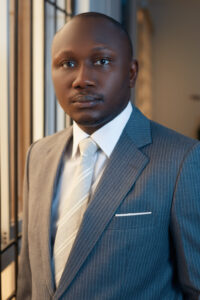 Mr. Oyetola Muyiwa Atoyebi, SAN is an exceptional Technology lawyer and thought leader with over a decade’s worth of experience in legal Practice and technology. He has facilitated numerous transactions and given countless legal opinions as regards tech in Nigeria, his outstanding performance has attracted international recognitions and awards. He is the youngest lawyer in Nigeria’s history to be conferred with the highly coveted rank of a Senior Advocate of Nigeria (SAN).
Mr. Oyetola Muyiwa Atoyebi, SAN is an exceptional Technology lawyer and thought leader with over a decade’s worth of experience in legal Practice and technology. He has facilitated numerous transactions and given countless legal opinions as regards tech in Nigeria, his outstanding performance has attracted international recognitions and awards. He is the youngest lawyer in Nigeria’s history to be conferred with the highly coveted rank of a Senior Advocate of Nigeria (SAN).
He is the Managing Partner of OMAPLEX Law Firm, an established law firm driven by Technology innovation. As an expert in emerging areas of law practice, he has core competence in information technology, cyber security, Fintech, Robotics and Artificial intelligence. He is described to be the go-to person when it comes to issues around tech.
The learned silk is best characterized as a diligent, resourceful and yet humble individual who is revered for his highly analytical and pragmatic approach to solving legal problems as well as an unwavering commitment to achieving client goals. Indeed, his hard work and dedication to his clientele sets him apart.
Beyond his interests in law, the learned silk is an avid golfer and a tech enthusiast.
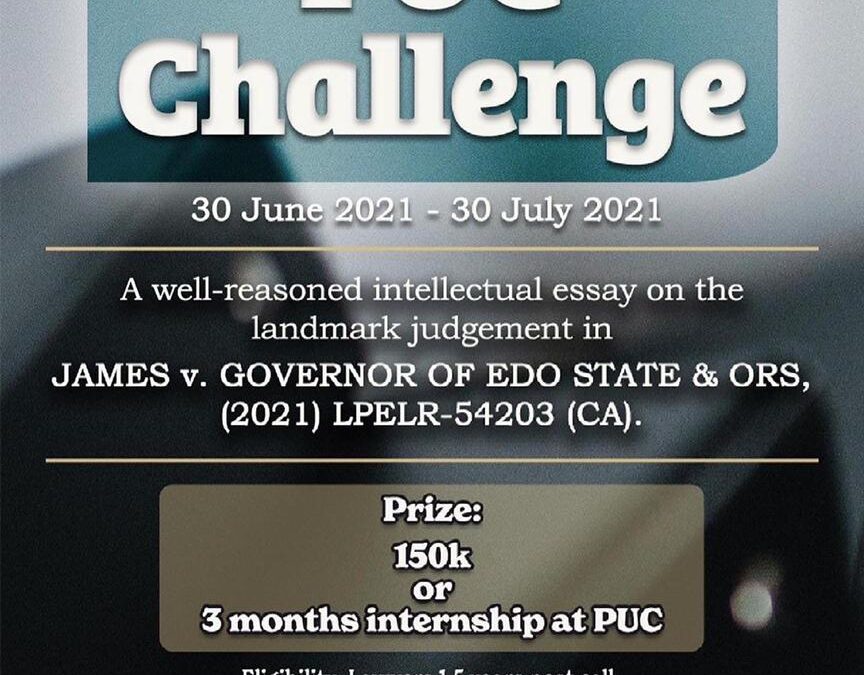
by Legalnaija | Jun 22, 2021 | Uncategorized
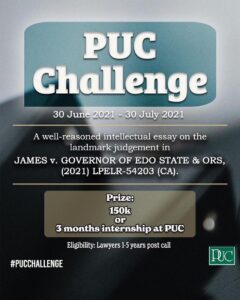
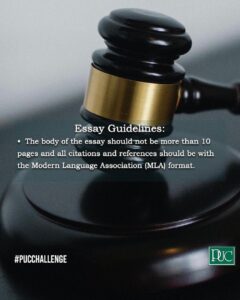
A new Paul Usoro & Co challenge is live!
Criteria: • All entries should be submitted in word or pdf format to the designated email address with full name, phone number and year of call. (puchallenge@paulusoro.com) • All present and past PUC employees are not eligible to participate. • The essay will be published on the PUC website.
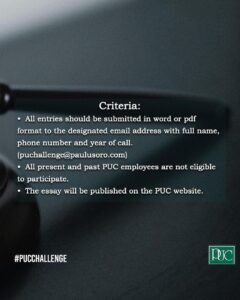 9th
9th
Essay Guidelines: • The body of the essay should not be more than 10 pages and all citations and references should be with the Modern Language Association (MLA) format.
N150k or a 3 month internship to be won!
#pucchallenge














 Mr. Oyetola Muyiwa Atoyebi, SAN is an exceptional Technology lawyer and thought leader with over a decade’s worth of experience in legal Practice and technology. He has facilitated numerous transactions and given countless legal opinions as regards tech in Nigeria, his outstanding performance has attracted international recognitions and awards. He is the youngest lawyer in Nigeria’s history to be conferred with the highly coveted rank of a Senior Advocate of Nigeria (SAN).
Mr. Oyetola Muyiwa Atoyebi, SAN is an exceptional Technology lawyer and thought leader with over a decade’s worth of experience in legal Practice and technology. He has facilitated numerous transactions and given countless legal opinions as regards tech in Nigeria, his outstanding performance has attracted international recognitions and awards. He is the youngest lawyer in Nigeria’s history to be conferred with the highly coveted rank of a Senior Advocate of Nigeria (SAN).


 9th
9th